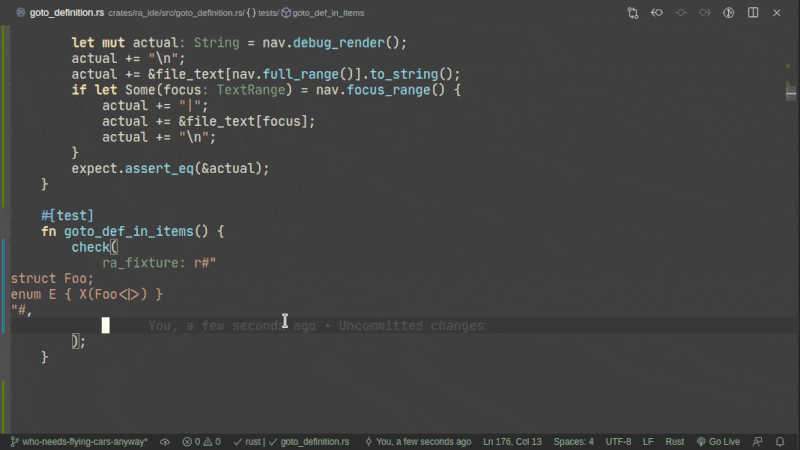14 releases (stable)
| 1.5.1 | Dec 21, 2024 |
|---|---|
| 1.5.0 | Apr 2, 2024 |
| 1.4.1 | Feb 28, 2023 |
| 1.4.0 | Jul 19, 2022 |
| 0.1.0 | Aug 21, 2020 |
#15 in Testing
603,144 downloads per month
Used in 197 crates
(182 directly)
28KB
662 lines
expect-test
Minimalistic snapshot testing for Rust.
Updating a failing test:
https://user-images.githubusercontent.com/1711539/120119633-73b3f100-c1a1-11eb-91be-4c61a23e7060.mp4
Adding a new test: Just leave a blank expect![[""]] and update it:

Checkout the docs for more: https://docs.rs/expect-test.
lib.rs:
Minimalistic snapshot testing for Rust.
Introduction
expect_test is a small addition over plain assert_eq! testing approach,
which allows to automatically update tests results.
The core of the library is the expect! macro. It can be though of as a
super-charged string literal, which can update itself.
Let's see an example:
use expect_test::expect;
let actual = 2 + 2;
let expected = expect!["5"]; // or expect![["5"]]
expected.assert_eq(&actual.to_string())
Running this code will produce a test failure, as "5" is indeed not equal
to "4". Running the test with UPDATE_EXPECT=1 env variable however would
"magically" update the code to:
let actual = 2 + 2;
let expected = expect!["4"];
expected.assert_eq(&actual.to_string())
This becomes very useful when you have a lot of tests with verbose and potentially changing expected output.
Under the hood, the expect! macro uses file!, line! and column! to
record source position at compile time. At runtime, this position is used
to patch the file in-place, if UPDATE_EXPECT is set.
Guide
expect! returns an instance of Expect struct, which holds position
information and a string literal. Use Expect::assert_eq for string
comparison. Use Expect::assert_debug_eq for verbose debug comparison. Note
that leading indentation is automatically removed.
use expect_test::expect;
#[derive(Debug)]
struct Foo {
value: i32,
}
let actual = Foo { value: 92 };
let expected = expect![["
Foo {
value: 92,
}
"]];
expected.assert_debug_eq(&actual);
Be careful with assert_debug_eq - in general, stability of the debug
representation is not guaranteed. However, even if it changes, you can
quickly update all the tests by running the test suite with UPDATE_EXPECT
environmental variable set.
If the expected data is too verbose to include inline, you can store it in
an external file using the expect_file! macro:
use expect_test::expect_file;
let actual = 42;
let expected = expect_file!["./the-answer.txt"];
expected.assert_eq(&actual.to_string());
File path is relative to the current file.
Suggested Workflows
I like to use data-driven tests with expect_test. I usually define a
single driver function check and then call it from individual tests:
use expect_test::{expect, Expect};
fn check(actual: i32, expect: Expect) {
let actual = actual.to_string();
expect.assert_eq(&actual);
}
#[test]
fn test_addition() {
check(90 + 2, expect![["92"]]);
}
#[test]
fn test_multiplication() {
check(46 * 2, expect![["92"]]);
}
Each test's body is a single call to check. All the variation in tests
comes from the input data.
When writing a new test, I usually copy-paste an old one, leave the expect
blank and use UPDATE_EXPECT to fill the value for me:
#[test]
fn test_division() {
check(92 / 2, expect![[""]])
}
See https://blog.janestreet.com/using-ascii-waveforms-to-test-hardware-designs/ for a cool example of snapshot testing in the wild!
Alternatives
- insta - a more feature full snapshot testing library.
- k9 - a testing library which includes support for snapshot testing among other things.
Maintenance status
The main customer of this library is rust-analyzer. The library is stable, it is planned to not release any major versions past 1.0.
Minimal Supported Rust Version
This crate's minimum supported rustc version is 1.60.0. MSRV is updated
conservatively, supporting roughly 10 minor versions of rustc. MSRV bump
is not considered semver breaking, but will require at least minor version
bump.
Dependencies
~120KB